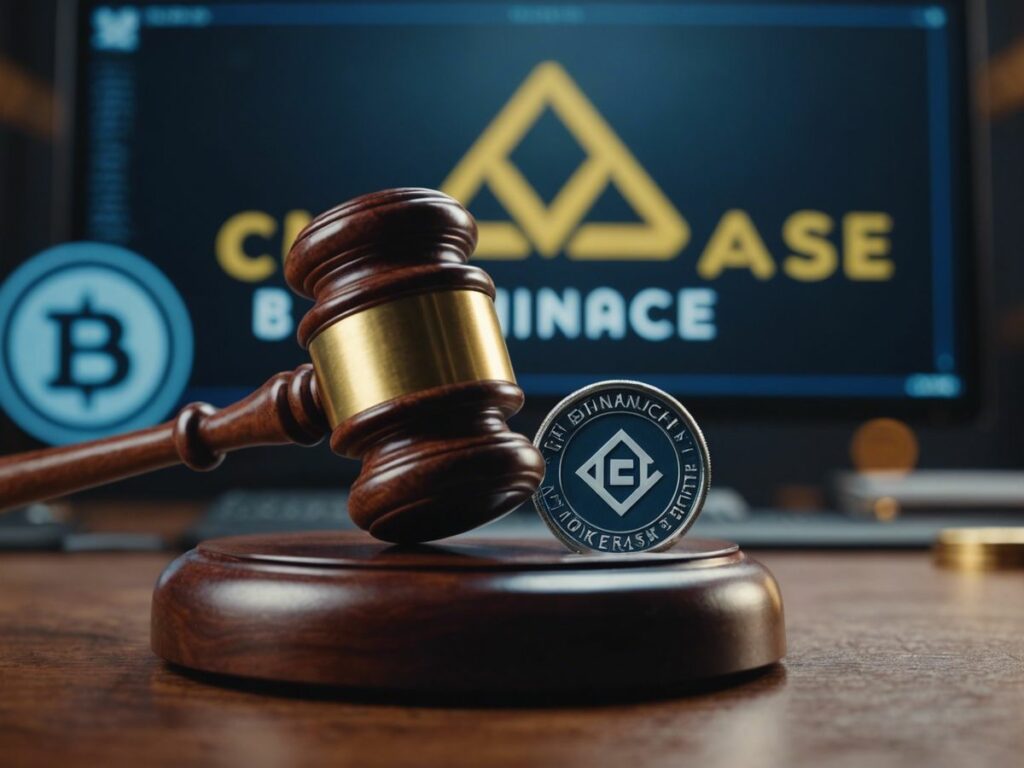In 2023, the U.S. Securities and Exchange Commission (SEC) initiated lawsuits against the world’s three largest crypto exchanges – Binance, Coinbase, and Kraken – marking the beginning of a stringent regulatory era for the crypto industry. These legal actions have significant implications for the future of cryptocurrencies and their regulation in the United States.
Key Takeaways
- The SEC has filed lawsuits against Binance, Coinbase, and Kraken, accusing them of various regulatory violations.
- The lawsuits have led to significant market reactions and raised questions about the future of crypto regulation in the U.S.
- The SEC has identified several cryptocurrencies as securities, which could lead to their delisting from U.S. exchanges.
SEC vs. Binance: Accusations and Market Impact
On June 5, 2023, the SEC filed a lawsuit against Binance, accusing the exchange of several violations, including running an unregistered exchange, selling Binance-owned cryptos BNB and BUSD, and using customer funds for its own interests. The allegations against Binance are severe, drawing parallels to the now-defunct FTX exchange.
The lawsuit remains unresolved as of late November 2023. The SEC is investigating whether Binance and its founder, Changpeng Zhao (CZ), had a “backdoor” to control assets on the Binance.US platform. Binance has responded by filing a motion to dismiss the lawsuit. The case is expected to extend into 2024, with Binance agreeing to pay a $4.3 billion fine to settle charges from other U.S. regulatory bodies.
SEC vs. Kraken: Commingling Complaints
On November 20, 2023, the SEC filed a complaint against Kraken, accusing the exchange of operating as an unregistered securities exchange and commingling customer funds for operating expenses. Kraken has denied the charges and intends to defend itself in court. This is not the first time Kraken has faced SEC action; in February 2023, it agreed to cease its crypto staking services and pay $30 million in fines.
SEC vs. Coinbase: Compliance Issues
A day after the Binance lawsuit, the SEC charged Coinbase with operating as an unregistered securities exchange and broker. The SEC also took issue with Coinbase’s staking-as-a-service program and its marketing campaigns. Coinbase has responded by agreeing to register part of its business with the SEC, but the lawsuit is expected to continue into 2024.
Cryptocurrencies Identified as Securities
The SEC has identified several cryptocurrencies as securities in its lawsuits against Binance and Coinbase. This classification could lead to their delisting from U.S. exchanges. The identified cryptocurrencies include:
- Binance vs. SEC lawsuit: Solana (SOL), Cardano (ADA), Polygon (MATIC), Filecoin (FIL), Cosmos (ATOM), Sandbox (SAND), Decentraland (MANA), Algorand (ALGO), Axie Infinity (AXS), Coti (COTI)
- Coinbase vs. SEC lawsuit: Solana (SOL), Cardano (ADA), Polygon (MATIC), Filecoin (FIL), Sandbox (SAND), Axie Infinity (AXS), Chilliz (CHZ), Flow (FLOW), Internet Computer (ICP), Near (NEAR), Voyager (VGX), Dash (DASH), Nexo (NEXO)
Market Reactions and Future Outlook
Despite the lawsuits, the cryptocurrency market has shown resilience. Bitcoin (BTC) and Ether (ETH) rebounded quickly from initial sell-offs. However, cryptocurrencies identified as securities experienced selling pressure. Binance saw significant withdrawals following the SEC lawsuit and its $4.3 billion fine.
The future of the crypto industry in the U.S. remains uncertain. Experts suggest that U.S. centralized exchanges may only list Bitcoin and Ether, while international exchanges could list other tokens. The industry is also lobbying for cryptocurrencies to be regulated by the Commodity Futures Trading Commission (CFTC) rather than the SEC.
Conclusion: The Inevitable Regulation
Cryptocurrency regulation in the U.S. appears inevitable. While the SEC’s actions have created uncertainty, there is hope that clear regulations will emerge, making crypto exchanges safer and more acceptable. The ongoing legal battles will likely set new precedents and shape the future of crypto regulation in the U.S.
Sources
- SEC vs Binance, Coinbase, Kraken Lawsuits Usher Tough New Era, Techopedia.
- Binance, Coinbase head to court; the SEC labels 67 crypto-securities, Cointelegraph.
- Full List of Cryptos Named Securities in SEC Lawsuits, BeInCrypto.
- SEC can’t find Binance CEO Changpeng Zhao, asks court for ‘alternative service’ , Cointelegraph.
